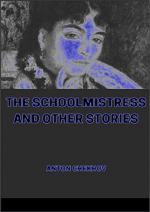The examining magistrate listened: there was no woman up there, it was the wind howling. It was rather cold, and he put his fur coat over his rug. As he got warm he thought how remote all this—the storm, and the hut, and the old man, and the dead body lying in the next room—how remote it all was from the life he desired for himself, and how alien it all was to him, how petty, how uninteresting. If this man had killed himself in Moscow or somewhere in the neighborhood, and he had had to hold an inquest on him there, it would have been interesting, important, and perhaps he might even have been afraid to sleep in the next room to the corpse. Here, nearly a thousand miles from Moscow, all this was seen somehow in a different light; it was not life, they were not human beings, but something only existing “according to the regulation,” as Loshadin said; it would leave not the faintest trace in the memory, and would be forgotten as soon as he, Lyzhin, drove away from Syrnya. The fatherland, the real Russia, was Moscow, Petersburg; but here he was in the provinces, the colonies. When one dreamed of playing a leading part, of becoming a popular figure, of being, for instance, examining magistrate in particularly important cases or prosecutor in a circuit court, of being a society lion, one always thought of Moscow. To live, one must be in Moscow; here one cared for nothing, one grew easily resigned to one’s insignificant position, and only expected one thing of life—to get away quickly, quickly. And Lyzhin mentally moved about the Moscow streets, went into the familiar houses, met his kindred, his comrades, and there was a sweet pang at his heart at the thought that he was only twenty-six, and that if in five or ten years he could break away from here and get to Moscow, even then it would not be too late and he would still have a whole life before him. And as he sank into unconsciousness, as his thoughts began to be confused, he imagined the long corridor of the court at Moscow, himself delivering a speech, his sisters, the orchestra which for some reason kept droning: “Oo-oo-oo-oo! Oo-oooo-oo!”
“Booh! Trah!” sounded again. “Booh!”
And he suddenly recalled how one day, when he was talking to the bookkeeper in the little office of the Rural Board, a thin, pale gentleman with black hair and dark eyes walked in; he had a disagreeable look in his eyes such as one sees in people who have slept too long after dinner, and it spoilt his delicate, intelligent profile; and the high boots he was wearing did not suit him, but looked clumsy. The bookkeeper had introduced him: “This is our insurance agent.”
“So that was Lesnitsky,... this same man,” Lyzhin reflected now.
He recalled Lesnitsky’s soft voice, imagined his gait, and it seemed to him that someone was walking beside him now with a step like Lesnitsky’s.
All at once he felt frightened, his head turned cold.
“Who’s there?” he asked in alarm.




